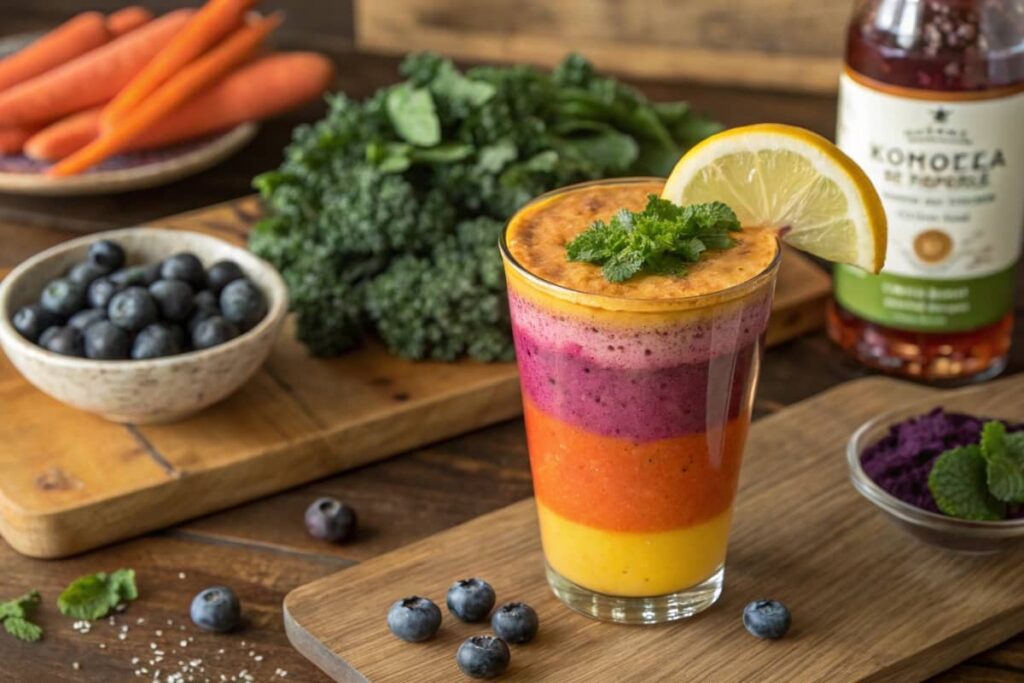Kombucha, the fizzy and tangy fermented tea, has become a popular choice for health-conscious individuals. But one question often arises—does kombucha have caffeine? If so, how much, and is it something to be concerned about? Let’s dive deep into the science, benefits, and considerations of caffeine in kombucha, and how it fits into a mindful, balanced lifestyle.
Table of Contents
What is Kombucha?
Kombucha is a fermented drink made from tea, sugar, and a SCOBY (symbiotic culture of bacteria and yeast). During the fermentation process, the bacteria and yeast consume most of the sugar, creating a tangy, slightly sweet beverage packed with probiotics.
Tea, the primary ingredient in kombucha, naturally contains caffeine. As a result, kombucha will also retain some caffeine content, but the levels vary depending on the type of tea and fermentation process.
Does Kombucha Contain Caffeine?
Yes, kombucha contains caffeine, but the amount is typically much lower than that of a standard cup of tea or coffee. Here’s why:
- Tea as a Base: The caffeine in kombucha comes from the tea used in its preparation, such as black, green, or white tea.
- Fermentation Reduces Caffeine: During fermentation, some of the caffeine is broken down by the SCOBY, resulting in lower caffeine levels than the original tea.
- Concentration Levels Vary: Different brands and homemade kombucha recipes will have varying levels of caffeine depending on the tea type and brewing time.
On average, an 8-ounce serving of kombucha contains about 10–15 milligrams of caffeine, compared to 30–50 milligrams in the same amount of tea and 95 milligrams in a standard cup of coffee.
Factors That Influence Caffeine Levels in Kombucha
The amount of caffeine in kombucha isn’t set in stone—it depends on several factors. Here’s what can influence caffeine content in your favorite fizzy drink:
1. Type of Tea Used
The type of tea used as the base determines the starting caffeine level:
- Black Tea: Highest caffeine content, typically resulting in kombucha with more caffeine.
- Green Tea: Moderate caffeine level, producing kombucha with a milder caffeine kick.
- White Tea: Lowest caffeine level, ideal for those wanting minimal caffeine in their kombucha.
Some kombucha varieties also use herbal teas, which are naturally caffeine-free. However, these blends often need a small amount of caffeinated tea to support fermentation.
2. Fermentation Time
The longer kombucha ferments, the more the caffeine content decreases. The bacteria and yeast in the SCOBY consume not only sugar but also some of the caffeine during the fermentation process.
- A short fermentation (7–10 days) may leave more caffeine intact.
- A longer fermentation (up to 14 days or more) will result in lower caffeine levels.
3. Concentration of Tea Used
The strength of the tea brew also plays a role:
- Strongly brewed tea, steeped for a longer time, will lead to kombucha with higher caffeine levels.
- Mildly brewed tea will produce kombucha with less caffeine.
4. Commercial vs. Homemade Kombucha
Store-bought kombucha often contains standardized caffeine levels, which are usually lower. Brands may use decaffeinated tea or adjust the fermentation process to minimize caffeine.
Homemade kombucha, on the other hand, can vary significantly based on personal brewing methods and tea choices.
5. Flavor Additions
Flavored kombucha made with fruits, herbs, or spices will not typically affect caffeine content. However, if additional caffeinated ingredients like guarana or matcha are added, it may increase caffeine levels.
By understanding these factors, you can control the caffeine content in kombucha to better suit your preferences and dietary needs.
Is the Caffeine in Kombucha a Concern?
The caffeine content in kombucha is relatively low compared to coffee, tea, or energy drinks, making it a suitable choice for many people. However, it’s still worth considering how caffeine in kombucha might affect you, especially if you’re sensitive to stimulants.
1. For Caffeine-Sensitive Individuals
If you’re sensitive to caffeine, kombucha may still be a good option due to its low caffeine levels. Start with a small amount, such as 4 ounces, and monitor how your body responds. Opt for kombucha made with green or white tea for an even milder effect.
2. For Pregnant or Breastfeeding Individuals
During pregnancy or while breastfeeding, caffeine intake should generally be limited. With only 10–15 milligrams of caffeine per serving, kombucha can be a lower-caffeine alternative to coffee or tea. Still, consult your healthcare provider before including it in your diet, as kombucha is a fermented beverage that contains trace amounts of alcohol.
3. For Children
Kombucha can be a healthy beverage choice for children due to its probiotics and low sugar content. However, the small amount of caffeine should be taken into account. Diluting kombucha with water or juice can reduce its caffeine concentration further.
4. For Those Avoiding Caffeine Entirely
If you’re avoiding caffeine for health or personal reasons, consider kombucha made with herbal or decaffeinated tea. These varieties contain little to no caffeine, while still delivering the benefits of probiotics.
5. Low Caffeine Alternatives
For those who want a probiotic beverage without any caffeine, alternatives like water kefir or dairy-based kefir may be better choices.
The caffeine in kombucha is rarely a cause for concern. However, being mindful of your overall caffeine intake and personal tolerance levels ensures you can enjoy kombucha as part of a balanced diet.
Benefits of Kombucha Beyond Caffeine
Kombucha isn’t just a fizzy drink with a hint of caffeine—it’s also packed with health benefits that go far beyond its stimulant content. From improving digestion to boosting immunity, this fermented tea offers a range of wellness advantages.
1. Rich in Probiotics
The fermentation process creates a wealth of probiotics, which are beneficial bacteria that promote a healthy gut. A balanced gut microbiome supports better digestion, reduces bloating, and even strengthens your immune system.
2. A Natural Detoxifier
Kombucha contains antioxidants and organic acids, such as glucuronic acid, which help the liver detoxify the body. These compounds neutralize free radicals and assist in flushing out toxins.
3. Boosts Energy Naturally
While the caffeine in kombucha is mild, it provides a gentle energy boost without the jitters often associated with coffee. The drink’s natural B vitamins also enhance energy levels, making it a great midday pick-me-up.
4. Supports Mental Clarity
Thanks to its antioxidants and probiotics, kombucha contributes to overall brain health. A healthy gut-brain axis can improve mood, mental clarity, and reduce feelings of stress.
5. Improves Digestion
Kombucha’s probiotics support the production of enzymes and aid in breaking down food. Regular consumption can help ease indigestion, prevent constipation, and promote smooth digestive function.
6. Strengthens the Immune System
A healthy gut microbiome is directly linked to a strong immune system. Kombucha’s probiotics, combined with its vitamins and antioxidants, enhance your body’s natural defenses against illness.
7. Low in Calories and Sugar
For those watching their calorie intake, kombucha serves as a healthier alternative to sugary sodas or energy drinks. While it contains some residual sugar from fermentation, the levels are much lower compared to most soft drinks.
8. Anti-Inflammatory Properties
The antioxidants in kombucha help reduce inflammation in the body, which can alleviate symptoms of chronic conditions and improve overall wellness.
9. Improves Skin Health
The antioxidants and probiotics in kombucha can improve skin health by reducing inflammation and promoting the detoxification process. A healthy gut often translates to a glowing complexion.
By incorporating kombucha into your routine, you’re not just enjoying a tasty drink—you’re also supporting your body and mind in multiple ways.
Delicious Recipes Using Kombucha
Kombucha isn’t just for sipping—it can also be a versatile ingredient in your kitchen! Its tangy, slightly sweet flavor pairs well with a variety of dishes, from marinades to desserts. Here are some creative ways to use kombucha in your cooking:
1. Kombucha Salad Dressing
Create a zesty, probiotic-rich salad dressing with kombucha.
Ingredients:
- 1/4 cup kombucha (flavored or unflavored)
- 2 tablespoons olive oil
- 1 tablespoon honey or maple syrup
- 1 teaspoon Dijon mustard
- Salt and pepper to taste
Instructions:
Whisk all the ingredients together in a bowl and drizzle over your favorite salad for a refreshing twist.

2. Kombucha Marinade for Meat or Vegetables
Tenderize and flavor meats or veggies with kombucha.
Ingredients:
- 1/2 cup kombucha
- 1/4 cup soy sauce or tamari
- 2 garlic cloves, minced
- 1 tablespoon grated ginger
- 1 tablespoon honey
Instructions:
Mix the ingredients and marinate your meat or vegetables for at least 30 minutes before grilling or roasting.
3. Kombucha Pancakes
Use kombucha as a substitute for buttermilk in pancakes for a fluffy and tangy result.
Ingredients:
- 1 cup flour
- 1 tablespoon sugar
- 1 teaspoon baking powder
- 1/4 teaspoon baking soda
- 1/2 teaspoon salt
- 1 cup kombucha
- 1 egg
- 1 tablespoon melted butter
Instructions:
Combine dry and wet ingredients separately, then mix until smooth. Cook on a hot griddle and serve with your favorite toppings.
4. Kombucha Mocktail
A refreshing non-alcoholic drink that’s perfect for any occasion.
Ingredients:
- 1 cup flavored kombucha (like ginger or berry)
- 1/2 cup sparkling water
- Fresh mint leaves
- Ice cubes
- Fresh fruit slices for garnish
Instructions:
Combine kombucha and sparkling water in a glass. Add mint leaves, ice, and garnish with fresh fruit for a fun and fizzy mocktail.

5. Kombucha Smoothie
Add probiotics to your smoothie for a gut-friendly boost.
Ingredients:
- 1 cup kombucha
- 1 banana
- 1/2 cup frozen berries
- 1/4 cup Greek yogurt (optional)
- A handful of spinach or kale (optional)
Instructions:
Blend all ingredients until smooth and enjoy as a nutritious breakfast or snack.
6. Kombucha Sorbet
Turn kombucha into a refreshing summer treat.
Ingredients:
- 2 cups flavored kombucha
- 1/2 cup honey or agave syrup
- 1/2 cup fresh fruit puree (e.g., mango, strawberry)
Instructions:
Mix the ingredients, pour into an ice cream maker, and freeze according to the machine’s instructions. If you don’t have an ice cream maker, pour into a shallow dish and freeze, stirring every 30 minutes until smooth.
7. Kombucha Glazed Vegetables
Add a tangy glaze to roasted vegetables.
Ingredients:
- 1/2 cup kombucha
- 2 tablespoons honey or maple syrup
- 1 tablespoon soy sauce
- 1 tablespoon olive oil
- Your choice of vegetables (e.g., carrots, Brussels sprouts, or squash)
Instructions:
Toss the vegetables in the kombucha glaze and roast at 400°F (200°C) for 20–25 minutes, stirring halfway through.
These recipes highlight how kombucha can be used creatively to add flavor, probiotics, and nutrients to your meals.
Frequently Asked Questions About Kombucha and Caffeine
Does kombucha have more caffeine than coffee?
No, kombucha has significantly less caffeine than coffee. While an 8-ounce cup of coffee contains about 95 milligrams of caffeine, kombucha typically contains only 10–15 milligrams per 8-ounce serving.
Will kombucha keep me awake?
Kombucha provides a mild energy boost due to its small caffeine content and natural B vitamins. However, it’s unlikely to keep you awake in the same way as coffee or energy drinks.
Does Synergy Kombucha have caffeine in it?
Yes, Synergy Kombucha, like most kombucha brands, contains caffeine. The exact amount depends on the tea base used and the fermentation process, but it is usually quite low—around 10–15 milligrams per serving.
Who should not drink kombucha?
Individuals who are pregnant, breastfeeding, or have compromised immune systems should consult a healthcare provider before drinking kombucha. Additionally, people sensitive to caffeine or with a history of digestive issues should proceed with caution.
Why do I feel weird after drinking kombucha?
Some people may experience bloating, gas, or mild digestive discomfort after drinking kombucha. This is often due to its probiotic content and fermentation, which can cause temporary gut adjustments.
Is kombucha actually good for your gut?
Yes! Kombucha is rich in probiotics, which support a healthy gut microbiome. This can improve digestion, reduce bloating, and enhance overall gut health.
Is it OK to have kombucha every day?
Yes, you can drink kombucha daily, but moderation is key. Stick to 8–16 ounces per day to enjoy the benefits without overloading your system with caffeine or trace alcohol.
What does kombucha do to your tummy?
Kombucha promotes better digestion by supporting the growth of healthy gut bacteria. It can also reduce bloating and aid in breaking down food more efficiently.
How much alcohol is in kombucha?
Kombucha contains trace amounts of alcohol, typically less than 0.5%, which classifies it as non-alcoholic. However, homemade or over-fermented kombucha may have slightly higher alcohol levels.
Can I drink kombucha if I am caffeine-sensitive?
Yes, kombucha is a great option for caffeine-sensitive individuals since it contains much less caffeine than coffee or tea. Opt for kombucha made with green or white tea for an even milder effect.

Conclusion
Kombucha is more than just a trendy drink—it’s a powerful combination of taste and health benefits. While it does contain a small amount of caffeine, it is significantly lower than coffee or tea, making it an excellent alternative for those seeking a milder energy boost. With its rich probiotics, detoxifying properties, and natural antioxidants, kombucha promotes better digestion, a stronger immune system, and improved gut health.
Whether you’re enjoying it for its fizzy flavor, health benefits, or as a mindful addition to your lifestyle, kombucha is a versatile and satisfying choice. For caffeine-sensitive individuals or those looking for even more customization, opting for low-caffeine or herbal varieties ensures you can enjoy kombucha worry-free.
Ultimately, kombucha is not just good for your body but also for your mind. Its gentle, natural energy and connection to a mindful, healthy lifestyle make it a perfect companion on your wellness journey. So, why not sip your way to better health—one fizzy glass at a time?
Related Links
Explore these related articles to deepen your knowledge about kombucha and its benefits:
- Agua de Kefir: A Refreshing Probiotic Drink
Discover how this probiotic-rich drink compares to kombucha and why it’s a gut-friendly choice. - Raw Kefir: The Ultimate Superfood for Gut Health
Learn about the raw, unprocessed version of kefir and its incredible health benefits. - Kefir Sheet Cake: A Unique and Moist Dessert
Find out how to incorporate kefir into a delicious sheet cake recipe for a probiotic twist.




